Hitler’s Love Affairs: Geli Raubal and Adolf Hitler
[This is not written by Hitler's friends, but it will still give you some insight into Hitler and women. Jan]
Geli Raubal
Sections
- Geli Raubal & Adolf Hitler
- Emil Maurice
- Jewish Music Teacher
- Death of Geli Raubal
- Primary Sources
- Student Activities
- References
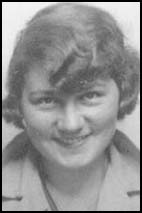
Geli Raubal, the daughter of Leo Raubal and Angela Raubal, was born in Linz on 4th June, 1908. When Adolf Hitler rented a house in Obersalzberg he asked his half-sister, Angela Raubal, now a widow, to be his housekeeper. She agreed and in August 1928 brought Geli with her to stay with Hitler. The 39 year-old Hitler soon fell in love with her and became her constant companion at meetings, restaurants, conferences and on walks in the mountains. In 1929 Hitler took an apartment in Munich’s Prinzregentenstrasse and the Raubal family moved in with him. (1)
Geli became a close friend of Henriette Hoffmann, the young daughter of Heinrich Hoffmann, Hitler’s official photographer. Hitler told Otto Wagener: "I can sit next to young women who leave me completely cold. I feel nothing, or they actually irritate me. But a girl like the little Hoffmann or Geli (Raubal) – with them I become cheerful and bright, and if I have listened for an hour to their perhaps silly chatter – or I have only to sit next to them – then I am free of all weariness and listlessness I can go back to work refreshed." (2)
Hitler once commented: "A girl of eighteen to twenty is as malleable as wax. It should be possible for a man, whoever the chosen woman may be, to stamp his own imprint on her. That’s all the woman asks for." Joachim Fest, the author of Hitler (1973), wrote that Hitler became obsessed with Geli: "The affection Hitler felt for this pretty, superficial niece soon developed into a passionate relationship hopelessly burdened by his intolerance, his romantic ideal of womanhood and avuncular scruples." (3)
Patrick Hitler, the son of Adolf’s brother, Alois Hitler, met her during this period: "Geli looks more like a child than a girl. You couldn’t call her pretty exactly, but she had great natural charm. She usually went without a hat and wore very plain clothes, pleated skirts and white blouses. No jewellery except a gold swastika given to her by Uncle Adolf, whom she called Uncle Alf." (4)
Geli Raubal & Adolf Hitler
Hitler became infatuated with Geli Raubal and rumours soon spread that he was having an affair with his young niece. Hitler told Heinrich Hoffman: "You know, Hoffmann, I’m so concerned about Geli’s future that I feel I have to watch over her. I love Geli and could marry her. Good! But you know what my viewpoint is. I want to remain single. So I retain the right to exert an influence on her circle of friends until such a time as she finds the right man. What Geli sees as compulsion is simply prudence. I want to stop her from falling into the hands of someone unsuitable." (5)
Adolf Hitler also took her with him to meetings. Baldur von Schirach commented: "The girl at Hitler’s side was of medium size, well developed, had dark, rather wavy hair, and lively brown eyes. A flush of embarrassment reddened the round face as she entered the room with him, and sensed the surprise caused by his appearance. I too stared at her for a long time, not because she was pretty to look at but because it was simply astonishing to see a young girl at Hitler’s side when he appeared at a large gathering of people. He chatted animatedly to her, patted her hand and scarcely paused long enough for her to say anything. Punctually at eleven o’clock he stood up to leave the party with Geli, who had gradually become more animated. I had the impression Geli would have liked to stay longer." (6)
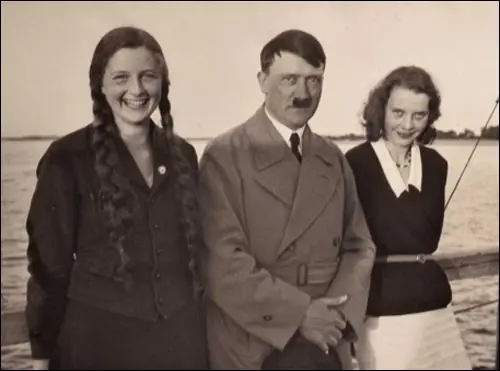 Adolf Hitler with Geli and Elfriede Raubal
Adolf Hitler with Geli and Elfriede Raubal
The couple lived together for over two years. The relationship with Geli was stormy and they began to accuse each other of being unfaithful. Geli was particularly concerned about Eva Braun, a seventeen-year-old girl who Hitler took for rides in his Mercedes car. Henriette Hoffman knew Eva, who worked in her father’s studio. She recalled that "Eva had pale blonde hair, cut short, blue eyes, and, although she had been educated in a Catholic convent, she had learnt feminine wiles – a certain look, and swaying hips when she walked, which made men turn their heads." According to his biographer, Ian Kershaw, "for the first time in his life (if we leave out his mother out of consideration) he became emotionally dependent on a woman." (7)
Ernst Hanfstaengel, who had a close relationship with Hitler at the time suggested that Geli was willing "to submit to his peculiar tastes" and was the "one woman in his life who went some way towards curing his impotence and half making a man out of him." He went on to say "that the services she was prepared to render had the effect of making him behave like a man in love… he hovered at her elbow with a moon-calf look in his eyes in a very plausible imitation of adolescent infatuation." (8)
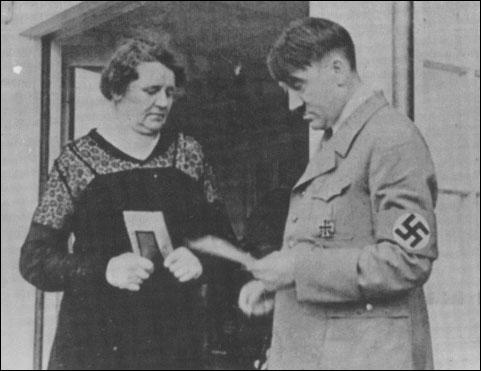 Adolf Hitler and his half-sister, Angela Raubal
Adolf Hitler and his half-sister, Angela Raubal
Anni Winter, Hitler’s housekeeper, claimed: "Geli loved Hitler. She was always running after him. Naturally, she wanted to be become Frau Hitler… He was highly eligible… but she flirted with everybody; she was not a serious girl." Emil Maurice commented: "He liked to show her off everywhere; he was proud of being seen in the company of such an attractive girl. He was convinced that in this way he impressed his comrades in the party, whose wives or girlfriends nearly all looked like washerwomen." (9)
Baldur von Schirach wrote in his autobiography: "He (Hitler) followed her into millinery shops and watched patiently while she tried on all the hats and then decided on a beret. He sniffed at the sophisticated French perfumes she enquired about in a shop on the Theatinerstrasse, and if she didn’t find what she wanted in a shop, he trotted after her… like a patient lamb. She exercised the sweet tyranny of youth, and he liked it, he was more cheerful, happier person." (10)
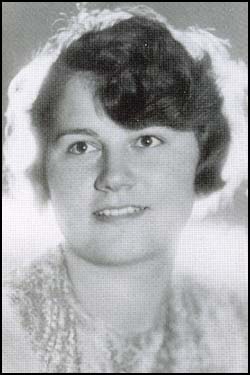 Geli Raubal
Geli Raubal
Adolf Hitler continued to live with Geli Raubal. However, Geli’s friend, Henriette Hoffmann, claims that Geli grew more and more indifferent to him while he grew more and more passionate about her. Geli began seeing other men. Wilhelm Stocker, an SA officer, was often on guard duty outside Hitler’s Munich flat, later told the author of Eva and Adolf (1974): "Many times when Hitler was away for several days at a political rally or tending to party matters in Berlin or elsewhere, Geli would associate with other men. I liked the girl myself so I never told anyone what she did or where she went on these free nights. Hitler would have been furious if he had known that she was out with such men as a violin player from Augsburg or a ski instructor from Innsbruck." (11)
Emil Maurice
Geli also began a relationship with Emil Maurice, Hitler’s chauffeur and bodyguard. Maurice later told Nerin E. Gun, the author of Eva Braun: Hitler’s Mistress (1969), about Geli. He testified that, "her big eyes were a poem and she had magnificent hair… people in the street would turn round to take another look at her, though people don’t do that in Munich." Maurice was aware that Hitler was very interested in Geli: "He liked to show her off everywhere; he was proud of being seen in the company of such an attractive girl. He was convinced that in this way he impressed his comrades in the party." (12)
Maurice admitted that he was "madly in love" with Geli and "I decided to become engaged to Geli… she gladly accepted my proposal". Henriette Hoffmann believes that Geli was in love with Maurice: "He was a sensitive man, not just someone who took pride in fighting, and there was a genuine tenderness behind his affability." Geli told Henriette that she no longer wanted to be loved by Hitler and preferred her relationship with Maurice: "Being loved is boring, but to love a man, you know, to love him – that’s what life is about. And when you can love and be loved at the same time, it’s paradise." (13)
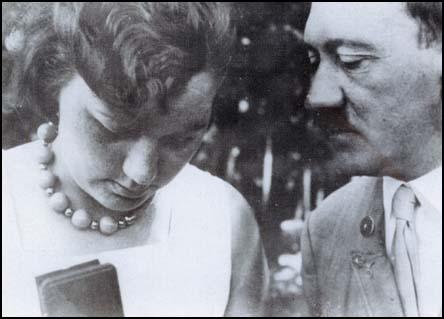 Geli Raubal and Adolf Hitler
Geli Raubal and Adolf Hitler
Ernst Hanfstaengel believes that Geli had turned away from Hitler because of his perverted sexual desires. This idea is supported by Wilhelm Stocker: "She (Geli) admitted to me that at times Hitler made her do things in the privacy of her room that sickened her but when I asked her why she didn’t refuse to do them she just shrugged and said that she didn’t want to lose him to some woman that would do what he wanted. She was a girl that needed attention and needed it often. And she definitely wanted to remain Hitler’s favourite girlfriend. She was willing to do anything to retain that status. At the beginning of 1931 I think she was worried that there might be another woman in Hitler’s life because she mentioned to me several times that her uncle didn’t seem to be as interested in her as he once was." (14)
Geli Raubal told Otto Strasser after one large argument with Hitler: "She told me that she really loved Hitler, but she couldn’t bear it any longer. His jealously wasn’t the worst thing. He demanded things from her that were simply disgusting. She had never dreamed that such things could happen. When I asked her to tell me, she described things I had previously encountered in my reading of Krafft-Ebing’s Psychopathia Sexualis when I was a student." (15)
Strasser later went into more detail about this when he was interviewed by officials of the US Officer of Strategic Studies in 1943. "Hitler made her undress…. He would lie down on the floor. Then she would have to squat over his face, where he could examine her at close range and this made him very excited. When the excitement reached its peak, he demanded that she urinate on him and this gave him sexual pleasure. Geli said the whole performance was extremely disgusting to her and… it gave her no gratification." (16)
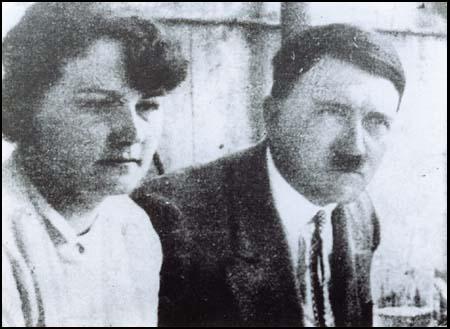 Geli Raubal and Adolf Hitler
Geli Raubal and Adolf Hitler
Heinrich Hoffmann claimed in his book, Hitler was my Friend (1955) that that Geli found Hitler’s controlling behaviour unpleasant: "The pressure under which Geli lives is burdensome to her, and what makes matters worse is that she’s prevented from saying how unhappy she feels…. The ball gave her no pleasure. It merely reminded her of how little freedom she has…. Certainly, it flattered her that her serious and unapproachable uncle, who was so good at hiding his feelings from everybody else, was fond of her. She wouldn’t have been a woman if she hadn’t been flattered by Hitler’s gallantry and generosity. But it seemed simply intolerable to this child of nature that he should want to mother her every step and that she shouldn’t be allowed to speak to anyone without his knowledge." (17)
Ernst Hanfstaengel suggests that Geli disliked his violent behaviour. In his autobiography he describes a visit to the Schwarzwälder Café: "Discussing politics as they politics as they walked through the streets after the meal, Hitler emphasised some threat against his opponents by cracking the heavy dog whip he still affected. I happened to catch a glimpse of Geli’s face as he did it, and there was on it such a look of fear and contempt that I almost caught my breath. Whips as well, I thought, and really felt sorry for the girl. She had displayed no sign of affection for him in the restaurant and seemed bored, looking over her shoulder at the other tables, and I could not help feeling that her share in the relationship was under compulsion." (18)
Ian Kershaw has argued in Hitler 1889-1936 (1998): "When Hitler found out about Geli’s liaison with Emil Maurice, his bodyguard and chauffeur, there was such a scene that Maurice feared Hitler was going to shoot him." Geli wrote to Maurice: "The postman has already brought me three letters from you, but never have I been so happy as I was over the last. Perhaps that’s the reason we’ve had such bad experiences over the last few days. Uncle Adolf is insisting that we should wait two years. Think of it, Emil, two whole years of only being able to kiss each other now and then and always having Uncle Adolf in charge. I can only give you my love and be unconditionally faithful to you. I love you so infinitely much. Uncle Adolf insists that I should go on with my studies." (19)
According to Ronald Hayman, the author of Hitler & Geli (1997), there are three versions of what afterwards happened to Maurice. He points out that Ernst Hanfstaengel believes that, instead of sacking him, Hitler "gradually started to freeze him out, fell behind in paying his wages, and in the end Maurice himself made the break." Another story is that Otto Strasser overheard a conversation in which Hitler told Maurice he was never to set foot in the house again, and Maurice replied: "Sack me, and I’ll take the whole story to the Frankfurter Zeitung!" Hitler gave in to the threat. "The third version is that Hitler threatened to sack Maurice unless he broke off the engagement, and implemented his threat when Maurice tried to defy him. It is possible that all three stories are untrue." Maurice was eventually sacked by Hitler. (20)
Jewish Music Teacher
Christa Schroeder, Hitler’s private secretary, claims that Geli fell in love with another man who has never been named. Apparently, he wanted to marry Geli and wrote to her in 1931: "Now your uncle, who knows how much influence he has over your mother, is trying to exploit her weakness with boundless cynicism. Unfortunately we won’t be in a position to fight back against this blackmail until after you’re twenty-one. He’s putting obstacles in the way of our mutual happiness although he knows that we’re made for each other. The year of separation your mother is imposing on us will only bind us together more closely. Because I’m always very strict with myself about thinking and behaving in a direct way, I find it hard to accept when other people don’t do that. But your uncle’s behaviour towards you can only be interpreted as egoistic. He quite simply wants you to belong to him one day and never to anyone else…. Your uncle still sees you as the ‘inexperienced child’ and refuses to acknowledge that in the meantime you’ve grown up and want to take responsibility for your own happiness. Your uncle is a force of nature. In his party they all bow down to him like slaves. I don’t understand how his keen intelligence can mislead him into thinking his obstinacy and his theories about marriage can destroy our love and our willpower. He’s hoping to succeed this year in changing your mind, but how little he knows your soul." (21)
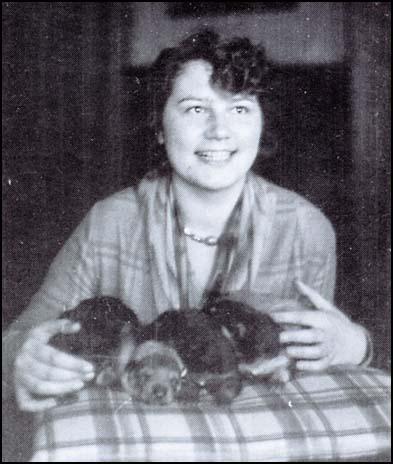 Geli Raubal
Geli Raubal
Ernst Hanfstaengel later wrote that Karl Anton Reichel told him that Hitler had shown him a letter he had recently written to Geli: "It was couched in romantic, even anatomical terms and could only be read in the context of a farewell letter of some sort. Its most extraordinary aspect was a pornographic drawing which Reichel could only describe as a symbol of impotence. Why on earth he should have been shown this letter I cannot imagine, but he was not the man to make up such a story." (22)
Hitler insisted that Geli Raubal and her friend, Henriette Hoffmann, received weapons training. They were both encouraged to carry loaded pistols around with them and they practiced shooting on a rifle range just outside Munich; they were taught how to use a safety catch and how to clean a Walther 6.35 pistol, taking it to pieces and putting it together again. Henriette said they enjoyed this as it made them feel like characters in a Western. (23)
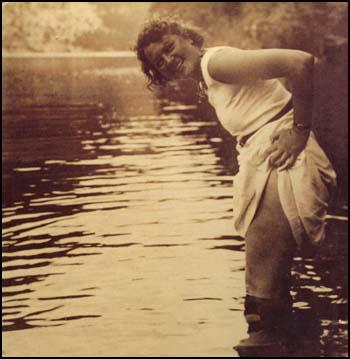 Geli Raubal
Geli Raubal
Geli continued to complain about the way Hitler controlled her life. Bridget Hitler claimed that her son told her a story that he had got from Anni Winter, Hitler’s housekeeper. She had overheard an argument about Geli wanting to go and stay in Vienna. Geli was very upset because he had originally given his approval but then changed his mind. Bridget heard Hitler say: "You say you have to go to Vienna? Is it to see that filthy Jew, the one who claims to be a singing teacher? Is that it? Have you been seeing him secretly again? Have you forgotten I forbade you to have anything to do with him? Tell me the truth now. Why do you want to go to Vienna?" According to Bridget she replied: "I have to go to Vienna, Uncle Alf, because I’m going to have a baby." (24)
Ronald Hayman, the author of Hitler & Geli (1997) has suggested: "What seems to have happened shortly before Geli died is that Hitler, who often changed his mind at the last minute, reversed his decision about letting her go to Vienna. It is quite likely that the other Nazi leaders were putting pressure on him. Though they would all have been glad to get rid of her, they may have told him it was unsafe to set her free: she knew too much. They may have found out that she had confided in other men about Hitler’s sexual habits, and Schwarz knew she had modelled for his pornographic drawings. If she talked indiscreetly in Vienna, stories might get picked up by the liberal press at the worst." (25)
Death of Geli Raubal
On the morning of Saturday, 19th September, 1931, Geli Raubal’s body was found on the floor of her room in the flat, by Georg Winter, the husband of Hitler’s housekeeper. In a statement later given to the police he explained what had happened that morning: "As the thing seemed to me rather suspicious, at ten o’clock I forced the double-door open with a screwdriver… As I’d opened the door I stepped into the room and found Raubal lying on the floor as a corpse. She’d shot herself. I can’t give any reason why she should have shot herself." (26)
It was later revealed that the previous evening, Hitler left for Hamburg as part of his electioneering in North Germany. It was alleged that they had quarrelled before his departure. Angela Raubal, Geli’s mother, later said she wanted to marry a violinist from Linz, but she and her half-brother had forbidden her to see the man. Cate Haste has suggested she may have been pregnant by a Jewish lover in Vienna. (27)
A meeting was held by leading officials in the Nazi Party before the police were called. This included Franz Schwarz, Gregor Strasser, Baldur von Schirach, Max Amann and Rudolf Hess. They discussed what they should do before the police were brought to Hitler’s apartment: "We know that a top-level conference of Munich Nazis was held in his flat during the morning of Saturday, 19 September, though we do not know what time it began or who convened it…. Eventually Schirach telephoned Adolf Dresler of the press department at the Brown House, instructing him to tell the press that Hitler had gone into deep mourning after his niece’s suicide. But they went on arguing about whether this was the best line to take, and they decided it was not. Schirach made another call to Dresler, telling him to say it had been an accident." (28)
The Münchener Neueste Nachrichten reported the following day. "According to a police communique, a twenty-three-year-old student fired a pistol aimed at the heart in a room of her flat in the Bogenhausen district. The unfortunate young woman, Angela Raubal, was the daughter of Adolf Hitler’s half-sister, and she and her uncle lived on the same floor of a block of flats on Prinzregentenplatz. On Friday afternoon the owners of the flat heard a cry but it did not occur to them that it came from their tenant’s room. When there was no sign of life from this room in the course of the evening, the door was forced. Angela Raubal was found lying face down on the floor, dead. Near her on the sofa was a small-calibre Walther pistol." (29)
The Münchener Post carried a story that suggested that the newspaper was relying on inside information. "On Friday 18 September there was once again a violent quarrel between Herr Hitler and his niece. What was the reason? The vivacious 23-year-old music student, Geli, wanted to go to Vienna, she wanted to become engaged. Hitler was strongly opposed to this. The two of them had recurrent disagreements about it. After a violent scene, Hitler left his flat on the second floor of 16 Prinzregentenplatz… The dead woman’s nose was broken, and there were other serious injuries on the body. From a letter to a female friend living in Vienna, it is clear that Fraulein Geli had the firm intention of going to Vienna. The letter was never posted." (30)
The unfinished letter was not a suicide note. It was addressed to someone in Vienna. The police report said that it was to a girlfriend but Baldur von Schirach has claimed it was to her music teacher. The tone was cheerful, and the letter broke off in the middle of the sentence: "When I come to Vienna – I hope very soon – we’ll drive together to Semmering an…". (Semmering is an attractive health resort outside Vienna.) Some historians have suggested that it was highly unlikely that someone would start a letter arranging a future holiday before committing suicide. (31)
Adolf Hitler reacted strongly against this news report. He issued a statement: "(1) It is untrue that I had either ‘recurrent disagreements’ or ‘a violent quarrel’ with my niece Angela Raubal on Friday 18 September or previously. (2) It is untrue that I was ‘strongly opposed’ to my niece’s travelling to Vienna. The truth is that I was never against the trip my niece had planned to Vienna. (3) It is untrue that my niece wanted to become engaged in Vienna or that I had some objection to my niece’s engagement. The truth is that my niece, tortured by anxiety about whether she really had the talent necessary for a public appearance, wanted to go to Vienna in order to have a new assessment of her voice by a qualified voice specialist. (4) It is untrue that I left my flat on 18 September 1931 ‘after a violent scene’. The truth is that there was no kind of scene and no agitation of any kind when I left my flat on that day." (32)
Dr. Muller, the police doctor who signed the death certificate dismissed the idea that Geli Raubal had been beaten up before the suicide. "On the face and especially on the nose were to be found no wounds connected with the bleeding of any kind. Nothing was to be found on the face except dark greyish death-marks which had proceeded from the fact that Raubal expired with her face to the floor and remained in that position for about 17-18 hours. That the tip of the nose was pressed slightly flat is due entirely to her lying with her face on the floor for several hours. The extreme discoloration of the death-marks in the face is probably to be explained by the fact that death was primarily consequent on suffocation following the shot in the lung." (33)
According to the police report, Geli Raubal had been bleeding from a wound near her heart and her clothes were soaked with blood. She was lying face downwards, with her nose against the floor. One arm was stretched out towards the pistol, a Walther 6.35, which was on the couch. The bullet, which had missed her heart, had pierced her lung. Still in her body, it had lodged on the left side of her back above the level of her hip. Ronald Hayman has pointed out: "This means that if she was standing or sitting when the shot was fired, the barrel of the pistol was pointing downwards, and the hand holding it was higher than her heart. Even if she was lying on the couch or the floor, it would not have been easy for her to shoot herself in this way. And why should she want to? Having been taught how to use a Walther, she could, if she wanted to kill herself, easily have avoided such a slow and painful death." (34)
Unfortunately, there was no inquest, and only one doctor examined her body before it was released, taken out of the country. One of the advantages of having the body taken across the frontier was that this would rule out any possibility of exhuming her for an inquest. Franz Gürtner, the Minister of Justice in Bavaria, was in a good position to cover up if she had been murdered. He held extreme right wing views and protected the Nazis during this period. According to Heinrich Hoffmann, it was her mother, Angela Raubaul, who decided that her daughter should be buried in Vienna. (35)
Geli Raubal was given a Catholic funeral when she was buried at the Zentralfriedhof Cemetery on 23rd September, 1931. Of course, people who had committed suicide were not allowed to have a Catholic funeral. Father Johann Pant, who conducted the service, later said that he could not have done what he did if Geli had died by her own hand. Pant, who had known Hitler for over twenty years, was obviously convinced that Geli had been murdered. He later fled Nazi Germany and went to live in Paris. In 1939 he wrote to the Courier d’Autriche newspaper and claimed: "They pretended that she committed suicide; I should never have allowed a suicide to be buried in consecrated ground. From the fact that I gave her Christian burial you can draw conclusions which I cannot communicate to you." (36)
Angela Raubal, later claimed: "I can’t understand why she did it. Perhaps it was an accident, and Geli killed herself while she was playing with the pistol which she got from him (Hitler)." Otto Wagener, who worked for Hitler, believes the death was an accident: "The bullet’s trajectory showed that she had the pistol in her left hand with the barrel towards her body. Since she was sitting at her desk and writing a totally innocent letter which was unfinished, we must assume that it came into her head to fetch the pistol and check whether it was loaded, at which point it went off and hit her in the heart – an unfortunate accident." (37)
Ian Kershaw also believes it was an accident: "Hitler’s political enemies had a field day. There were no holds barred on the newspaper reports. Stories of violent rows and physical mistreatment mingled with sexual innuendo and even the allegation that Hitler had either killed Geli himself or had had her murdered to prevent scandal. Hitler himself was not in Munich when his niece died. And it is not easy to see the reasoning for a commissioned murder to prevent a scandal being carried out in his own flat. As it was, the scandal was enormous." (38)
Rudolf Hess believed that Geli Raubal had been killed by a jealous woman who got into the flat during the night. The anti-Nazi journalist, Konrad Heiden, has argued that Geli was pregnant by a Jewish man and that just before her death she was visited by Heinrich Himmler. He told her that she had "betrayed the man who was her guardian, her lover and her Führer in one – according to National Socialist conceptions there was only one way of making good such a betrayal." Heiden points out that the man who told him this story, Father Bernhard Stempfle, was murdered on the orders of Hitler on 30th June, 1934. (39)
Six years after Geli’s death Bridget Hitler visited Ernst Hanfstaengel, who was then living in London. Bridget told Hanfstaengel that she was convinced that it was suicide rather than murder. She claimed that "the immediate family knew very well that the cause of Geli’s suicide was the fact that she was pregnant by a young Jewish art teacher in Linz, whom she had met in 1928 and wanted to marry at the time of her death." (40)
Henriette Hoffmann, her closest friend, believed that Geli had killed herself: "He (Hitler) fenced her life so tightly, confined her in such a narrow space that she saw no other way out. Finally she hated her uncle, she really wanted to kill him. She couldn’t do that. So she killed herself, to hurt him deeply enough, to disturb him. She knew that nothing else would wound him so badly. And because he knew too, he was so desperate, he had to blame himself." (41)
Rudolf Hess claimed that Hitler became suicidal because of the rumours that he had shot Geli Raubal. "He was so fearfully vilified by this new campaign of lies that he wanted to make an end of everything. He could no longer look at a newspaper because this frightful filth was killing him. He wanted to give up politics and never again appear in public."
One consequence of Geli’s suicide was that Hitler became a vegetarian. He claimed that meat now reminded him of Geli’s corpse. Alan Bullock, the author of Hitler: A Study in Tyranny (1962) has argued that Geli’s death dealt him "a greater blow than any other event in his life. For days he was inconsolable and his friends feared he would take his own life… For the rest of his life he never spoke of Geli without tears coming to his eyes; according to his own statement to a number of witnesses, she was the only woman he ever loved." (42)
Ernst Hanfstaengel wrote in The Missing Years (1957): "I am sure that the death of Geli Raubal marked a turning point in the development of Hitler’s character. This relationship, whatever form it took in their intimacy, had provided him for the first time in his life with a release to his nervous energy which only too soon was to find its final expression in ruthlessness and savagery. His long connection with Eva Braun never produced the moon-calf interludes he had enjoyed with Geli and which might in due course, perhaps, have made a normal man out of him. With her death the way was clear for his final development into a demon, with his sex life deteriorating again into a sort of bisexual narcissus-like vanity, with Eva Braun little more than a vague domestic adjunct." (43)
Source: https://spartacus-educational.com/GERraubal.htm

